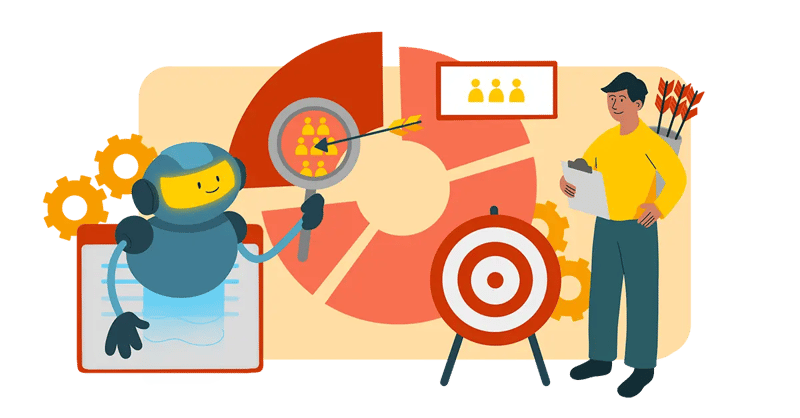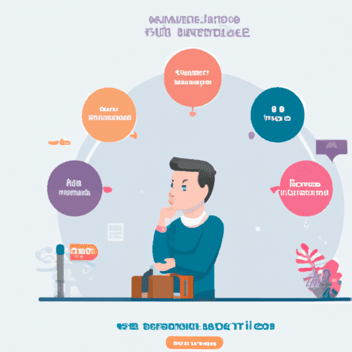IA et contenu: adapter aux phases du parcours d'achat.
Avez-vous déjà eu l'impression que votre contenu parle une langue différente de celle de votre public ? Il est essentiel d'adapter le contenu à chaque étape du parcours de l'acheteur, mais c'est une tâche qui prend beaucoup de temps. Si vous ratez le coche, les clients potentiels disparaissent. Heureusement, il existe une solution à ces deux problèmes.
Découvrez comment l'IA peut adapter votre contenu existant à chaque étape du parcours de l'acheteur, afin de délivrer le bon message au bon moment.

L'importance (et les défis) du parcours de l'acheteur
Imaginez que vous parcourez les médias sociaux, submergé par une surcharge d'informations. Vous cliquez sur un article intitulé "Le guide ultime du vélo de montagne". Excité à l'idée d'apprendre les ficelles de ce sport passionnant, vous commencez à lire. Mais en quelques secondes, votre enthousiasme se dégonfle. L'article se penche sur les comparaisons d'équipements techniques et les techniques de conduite avancées. Vous êtes un débutant complet, pas un professionnel chevronné ! Ce contenu ne répond pas du tout à vos besoins.
Ce scénario illustre parfaitement l'importance de comprendre le cheminement de votre public vers l'achat. En marketing, nous appelons cela le parcours de l'acheteur. Il s'agit d'un parcours bien défini que suivent les clients, depuis la prise de conscience de leurs besoins jusqu'à la décision d'achat. Ce parcours comporte trois étapes clés :
-
La prise de conscience: À ce stade, les clients potentiels prennent conscience d'un problème ou d'un défi auquel ils sont confrontés. Ils font des recherches actives et recueillent des informations pour comprendre les options qui s'offrent à eux.
-
Réflexion: Ils ont maintenant identifié des solutions potentielles (dont la vôtre !). Ils comparent les différentes options, pèsent le pour et le contre et recherchent activement des informations pour valider leurs choix.
-
Décision : Il s'agit de l'étape finale au cours de laquelle les clients prennent leur décision d'achat. Ils cherchent à être rassurés et veulent comprendre pourquoi votre solution répond le mieux à leurs besoins.
La création d'un contenu de haute qualité qui trouve un écho auprès de votre public à chaque étape peut s'avérer décourageante. Cela nécessite une compréhension approfondie de leurs besoins et de leurs défis à chaque étape du parcours de l'acheteur. Imaginez que vous rédigiez des articles de blog informatifs pour des débutants complets au stade de la "sensibilisation", puis que vous adaptiez ces mêmes articles pour mettre en évidence l'avantage concurrentiel de votre produit au stade de la "décision". C'est un processus qui prend du temps et qui exige des ressources importantes.
C'est ici que l'intelligence artificielle (IA) change la donne. AI
- reciblage publicitaire alimenté par l'IA
Transformer le contenu grâce à l'IA
La transformation du contenu par l'IA vous permet d'exploiter votre contenu existant et de l'adapter aux différentes étapes du parcours de l'acheteur. Cette technologie vous permet de délivrer le bon message à la bonne personne au bon moment. Imaginez que vous preniez un article générique sur les vélos de montagne et que vous le transformiez en trois articles attrayants - un qui suscite l'intérêt des débutants, un autre qui compare différentes options de vélos, et un dernier qui les convainc que votre modèle spécifique est le choix idéal. L'IA fait de cette transformation une réalité, en libérant vos ressources et en optimisant votre stratégie de marketing de contenu. Marketing basé sur les données avec l'IA
-
L'IA peut transformer le contenu existant en nouveaux formats 5 à 10 fois plus rapidement que les méthodes traditionnelles.
-
La création de contenu assistée par l'IA peut diminuer les coûts de production de contenu jusqu'à 60 %.
-
Le marché de la création de contenu par l'IA atteindra 1,07 milliard de dollars d'ici 2026, affichant un taux de croissance notable de 34,1 %.
Voici comment cela fonctionne : Vous débloquez une puissante boîte à outils en alimentant un moteur d'IA avec votre contenu. L'IA analyse la langue, le ton et la structure pour comprendre le message principal. Ensuite, grâce à sa vaste base de connaissances et à sa compréhension de la psychologie humaine, elle peut réécrire le contenu pour cibler une étape spécifique de l'acheteur.
Les avantages de la transformation du contenu par l'IA sont indéniables :
-
Efficacité accrue : Ne perdez plus de temps et de ressources à rédiger des contenus à partir de zéro pour chaque étape de l'achat. L'IA vous permet de réutiliser le contenu existant, ce qui vous fait gagner un temps précieux et de l'argent.
-
Amélioration du ciblage de l'audience : Imaginez que vous vous adressiez directement à votre client idéal à chaque étape de son parcours. L'IA adapte votre message en fonction de leurs besoins et de leurs défis, pour un impact maximal.
-
Amélioration de la performance du contenu : Les contenus qui parlent le bon langage sont remarqués. Le contenu transformé par l'IA est susceptible de capter l'attention, de stimuler l'engagement et de favoriser les conversions à toutes les étapes du parcours de l'acheteur.
La transformation du contenu par l'IA en action
Prenons un exemple concret : le marketing des médias sociaux pour les petites entreprises. Il s'agit d'un sujet avec lequel de nombreux propriétaires de petites entreprises se débattent, se sentant souvent dépassés par le paysage en constante évolution et incertains de la meilleure façon de tirer parti de cet outil puissant. Mais que se passerait-il si vous pouviez prendre un simple élément de contenu, par exemple un article de blog sur les bases du marketing des médias sociaux, et le transformer à l'aide d'invites d'IA pour le faire résonner avec des clients potentiels à chaque étape de leur parcours d'achat ?
C'est là que la transformation de contenu pilotée par l'IA brille. Nous allons voir comment, à l'aide d'invites spécifiques, nous pouvons adapter ce contenu pour cibler les besoins et l'état d'esprit uniques des clients aux stades de la prise de conscience, de la considération et de la décision. À la fin de cet exemple, vous verrez comment l'IA peut vous permettre de créer une expérience de contenu transparente et ciblée pour votre public, ce qui se traduira en fin de compte par de meilleurs résultats pour vos efforts de marketing sur les médias sociaux.
Étape 1 : Sensibilisation
-
Titre et ton : "Vous vous sentez dépassé par les médias sociaux ? Comment les petites entreprises peuvent prendre le contrôle". (Informatif, conscient du problème)
-
Contenu ciblé : Cette section d'ouverture reconnaît les défis des petites entreprises en matière de marketing des médias sociaux. Voici quelques points spécifiques à prendre en compte :
-
Temps et ressources limités : De nombreuses petites entreprises ont plusieurs casquettes et peinent à trouver le temps de créer et de gérer le contenu des médias sociaux de manière cohérente.
-
Suivre les changements d'algorithmes : Les plateformes de médias sociaux mettent constamment à jour leurs algorithmes, ce qui fait qu'il est difficile pour les entreprises de garder une longueur d'avance et de s'assurer que leur contenu atteint leur public cible.
-
Mesurer le retour sur investissement : Quantifier le retour sur investissement (ROI) des efforts de marketing sur les médias sociaux peut s'avérer délicat. Les entreprises peuvent avoir du mal à suivre l'impact de leurs campagnes de médias sociaux sur le trafic du site web, les prospects et les ventes.
-
-
Avantages à explorer : Cette section présente ensuite des solutions potentielles à des problèmes courants, afin que les lecteurs sachent quelles solutions et quels services rechercher.
-
Augmentation de la notoriété de la marque: Une présence bien gérée sur les médias sociaux aide les petites entreprises à se faire connaître et à développer la reconnaissance de leur marque au sein de leur marché cible.
-
Engagement des clients : Les médias sociaux permettent aux entreprises d'entrer directement en contact avec leurs clients, ce qui favorise l'établissement de relations plus étroites et la création d'un public fidèle.
-
Stimuler les ventes : Un marketing efficace sur les médias sociaux peut générer des prospects, générer du trafic vers le site web d'une entreprise et, en fin de compte, convertir les adeptes en clients payants.
-
💡AI Prompt :
"Réécrivez cet article pour l'étape de sensibilisation du parcours de l'acheteur. Concentrez-vous sur les difficultés courantes auxquelles les petites entreprises sont confrontées avec le marketing des médias sociaux et sur les avantages potentiels de sa maîtrise."
Cet article d'introduction, conçu pour un public en phase de prise de conscience, suscite son intérêt et présente le marketing des médias sociaux comme une solution à ses problèmes. Le contenu met en évidence les points douloureux mentionnés ci-dessus et reconnaît que de nombreuses petites entreprises se sentent dépassées. Il explore ensuite les avantages potentiels de la maîtrise des médias sociaux.
Étape 2 : Considération
-
Titre et ton : "Conquer Social Media : Stratégies éprouvées pour les petites entreprises". (Orienté vers la solution, persuasif)
-
Contenu ciblé : Maintenant que le public connaît les défis et les avantages potentiels, cette section se penche sur les solutions pratiques. Voici quelques stratégies de marketing des médias sociaux à envisager pour les petites entreprises :
-
Marketing de contenu : La création d'un contenu utile et attrayant, tel que des articles de blog, des infographies ou des vidéos, positionne votre entreprise en tant qu'expert du secteur et attire des clients potentiels.
-
Publicité sur les médias sociaux : La publicité payante sur les plateformes de médias sociaux vous permet de cibler des données démographiques et des intérêts spécifiques, garantissant ainsi que votre message atteindra le bon public.
-
Création d'une communauté : L'interaction régulière avec les personnes qui vous suivent par le biais de commentaires, de messages et de sondages favorise un sentiment d'appartenance à la communauté et maintient l'engagement de votre public.
-
💡AI Prompt :
"Réécrivez ce contenu pour l'étape de la considération, en vous concentrant sur les différentes stratégies de marketing des médias sociaux pour les petites entreprises et sur la façon dont elles peuvent relever les défis mentionnés précédemment."
En présentant ces stratégies, cette section responsabilise le public à l'étape de la considération. Elle montre comment le marketing des médias sociaux peut être abordé de manière réfléchie et efficace. Le contenu met en évidence la manière dont chaque stratégie répond aux défis initiaux soulevés au stade de la prise de conscience, en fournissant des solutions réalisables.
Étape 3 : Décision
-
Titre et ton : "Ne perdez plus de temps ! Comment [votre solution] rationalise le marketing des médias sociaux". (axé sur les avantages, fort)
-
Contenu ciblé : C'est ici que vous présentez l'avantage concurrentiel d'une solution spécifique de marketing des médias sociaux (que nous appellerons " [Votre solution] "). Il peut s'agir d'une plateforme logicielle, d'un service géré proposé par votre entreprise ou d'une autre offre pertinente.
-
Points clés à prendre en compte :
-
-
Efficacité : Soulignez comment votre solution permet aux entreprises d'économiser du temps et des ressources en rationalisant les tâches de création de contenu, de programmation et de gestion des médias sociaux.
-
Public ciblé : Soulignez comment votre solution permet de cibler précisément les clients idéaux grâce à des filtres démographiques et d'intérêt avancés.
-
Résultats mesurables : Montrez comment votre solution propose des outils d'analyse et de reporting intégrés, permettant aux entreprises de suivre le retour sur investissement de leurs campagnes de médias sociaux et d'en mesurer le succès.
-
💡AI Prompt :
"Réécrivez ce contenu pour l'étape de la décision. Mettez en évidence les avantages uniques et les avantages concurrentiels de [Votre solution] par rapport à d'autres options de marketing des médias sociaux."
Cette dernière section positionne votre solution comme le choix évident pour les petites entreprises qui cherchent à relever les défis des médias sociaux. En mettant en avant les fonctionnalités qui permettent de gagner du temps, les capacités de ciblage et les informations fondées sur des données offertes par "[Votre solution]", vous fournissez un argument convaincant pour expliquer pourquoi les entreprises devraient choisir votre offre plutôt que d'autres options.
La puissance d'un contenu adapté à chaque étape du parcours de l'acheteur
Cet exemple de marketing des médias sociaux pour les petites entreprises est une illustration puissante de l'IA dans le marketing et le marketing de contenu en particulier. Nous avons vu comment un simple élément de contenu peut être stratégiquement adapté à l'aide d'invites d'IA pour trouver un écho auprès des clients potentiels à chaque étape cruciale du parcours de l'acheteur :
-
Sensibilisation : Nous avons abordé les défis et les craintes initiales des petites entreprises concernant les médias sociaux, suscitant leur intérêt pour l'exploration de leurs avantages potentiels.
-
Considération : Nous avons approfondi le sujet en présentant des stratégies concrètes de marketing par les médias sociaux comme des solutions, ce qui leur a permis de passer à l'action et de réfléchir à la manière dont ces stratégies peuvent répondre à leurs besoins spécifiques.
-
Décision : Enfin, nous avons présenté les avantages concurrentiels d'une solution spécifique, la positionnant comme le choix évident pour surmonter les obstacles liés aux médias sociaux et atteindre le succès.
Cette capacité à adapter le contenu à chaque étape est ce qui rend la transformation par l'IA si précieuse. Elle vous permet de délivrer le bon message au bon moment, ce qui favorise un engagement plus profond de l'audience et, en fin de compte, les conversions.
N'oubliez pas que la puissance de la transformation de contenu par l'IA peut s'appliquer à n'importe quel type de contenu, des articles de blog et des textes de sites Web aux campagnes d'e-mailing et aux descriptions de produits. En exploitant l'IA pour créer un contenu ciblé pour chaque étape du parcours de l'acheteur, vous pouvez vous assurer que vos efforts marketing sont ciblés et ont un impact maximal.
Prêt à utiliser l'IA pour renforcer votre stratégie marketing? Contactez Aspiration Marketing dès aujourd'hui pour une consultation gratuite et découvrez comment nous pouvons vous aider à créer une expérience de contenu transparente et ciblée pour votre public.
This content is also available in:
- Deutsch: KI-Nutzung: Inhalte an Käuferreise-Phasen anpassen
- English: How We Use AI to Adapt Content to the Stages of the Buyer's Journey
- Español: Cómo utilizamos la IA para adaptar el contenido a la Buyer Journey
- Italiano: Intelligenza Artificiale: Contenuti per Ogni Fase del Buyer's Journey
- Română: Cum AI Transformă Conținutul pentru Etapele Buyer's Journey
- 简体中文: 利用人工智能根据买家旅程阶段调整内容









Laisser un commentaire